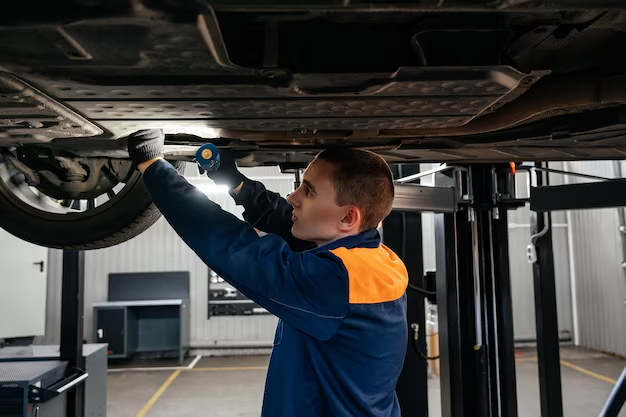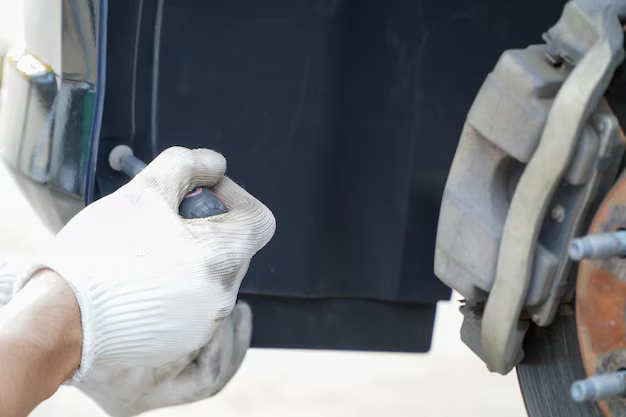Brakes are one of the most important safety systems in your vehicle. They give you the stopping power you need to avoid accidents, control your speed, and drive with confidence. Yet brake pads—those small but crucial components—don’t last forever. Sooner or later, they wear down and need replacement.
Knowing when to replace brake pads isn’t just about following a set schedule. It’s about recognizing the signs, understanding your vehicle’s needs, and keeping your braking system in top condition. This guide will walk you through how long brake pads typically last, what warning signs to watch for, and how a professional inspection can save you time, money, and stress.

Understanding the Role of Brake Pads
Your brake pads are the friction material that presses against the brake rotors to slow or stop your vehicle. When you step on the brake pedal, hydraulic pressure forces the pads to clamp onto the rotors, converting your car’s forward motion into heat.
Over time, that friction wears the pads down. Once they’re too thin, they can’t do their job effectively, and that can put you at serious risk.
How Long Do Brake Pads Last?
Brake pad lifespan depends on a number of factors, including your driving style, the type of vehicle you have, the materials used in the pads, and the conditions in which you drive. On average, brake pads last anywhere from 30,000 to 70,000 miles.
However, those numbers are just a guideline. If you regularly drive in stop-and-go traffic, tow heavy loads, or navigate steep hills, you might need new brake pads much sooner. On the other hand, if most of your driving is on open highways, your pads may last longer.
That’s why it’s important to follow a brake maintenance schedule and get them inspected regularly—especially if you’re not sure how much life they have left.
Signs of Worn Brake Pads
Catching brake pad wear early is key to avoiding more costly repairs and ensuring your safety. Here are some of the most common warning signs:
1. Squealing or Screeching Sounds
Most brake pads have wear indicators—small metal tabs that make a high-pitched noise when the pad material gets low. This sound is your early warning to schedule a brake inspection.
2. Grinding Noises
If you hear grinding when you brake, your pads may be worn down completely, allowing the metal backing to contact the rotors. This not only reduces stopping power but can also damage the rotors, leading to more expensive repairs.
3. Reduced Braking Performance
If your car feels like it takes longer to stop, your brake pads could be too thin to generate enough friction. This can be dangerous, especially in emergency situations.
4. Brake Pedal Vibration
A vibrating or pulsating brake pedal often indicates uneven pad wear or warped rotors. Either way, it’s a sign you need professional attention.
5. Dashboard Warning Light
Many newer vehicles have brake system warning lights that illuminate when there’s a problem. Don’t ignore it—it’s your car telling you something’s wrong.
Checking Brake Pad Thickness
If you’re curious about your brake pad condition, you can visually inspect them through the wheel spokes. New brake pads are usually about 8 to 12 millimeters thick. Once they’re down to around 3 millimeters, it’s time to replace them.
However, keep in mind that pad thickness is only part of the picture. Uneven wear, glazing (a shiny, hardened surface from overheating), or contamination from oil or brake fluid can all reduce effectiveness even if the pads still have some thickness left.
Why Timely Brake Pad Replacement Matters
Waiting too long to replace brake pads can lead to:
- Longer stopping distances, increasing the risk of accidents.
- Damage to rotors, which are more costly to replace than pads.
- Brake system overheating, which can cause total brake failure.
- Increased repair bills, as worn pads often lead to related component damage.
By replacing pads at the right time, you maintain optimal braking performance, protect your rotors, and keep your vehicle safe to drive.
How to Extend Brake Pad Life
While brake pads will eventually wear out no matter what, you can help them last longer with these habits:
- Brake smoothly and gradually instead of slamming on the brakes.
- Reduce heavy loads when possible, as extra weight increases braking force.
- Coast to slow down when approaching stops instead of braking late.
- Maintain safe following distances to avoid sudden stops.
- Get regular brake inspections, so any issues can be addressed before they cause damage.
The Role of Professional Brake Inspections
A trained mechanic doesn’t just look at pad thickness—they assess the entire braking system, including rotors, calipers, brake lines, and fluid condition. With state-of-the-art diagnostics, a shop like Qwik Oil & Auto Care in Prosper, TX can pinpoint issues early and recommend the right repairs to keep you safe.
Their ASE-certified technicians perform full brake inspections, checking for:
- Pad thickness and wear pattern
- Rotor condition and thickness
- Brake fluid level and quality
- Caliper performance
- Signs of leaks or corrosion
With this detailed assessment, you’ll know exactly when to replace your pads and whether any other components need attention.

How Often Should You Replace Brake Pads? The Real Answer
While mileage ranges can help, the best answer is this: Replace your brake pads as soon as they show signs of wear or reach the minimum safe thickness. That could be every 30,000 miles for some drivers or 60,000 miles for others.
If you’re unsure, have them inspected at least once a year—or twice a year if you drive in demanding conditions. And remember, brakes are not an area where you want to take chances.
Keep Your Brakes in Top Shape in Prosper, TX
Your brake system is too important to overlook. Whether you’ve noticed squealing, reduced braking power, or just haven’t had a checkup in a while, getting a professional inspection can make all the difference.
At Qwik Oil & Auto Care, we provide expert brake services—from pad replacements to full system inspections—so you can drive with complete confidence. We offer a free brake check for a limited time, along with flexible financing options to make essential repairs easier on your budget.
Schedule your brake inspection today and keep your vehicle’s stopping power at its best. Your safety, and the safety of everyone on the road, depends on it.
